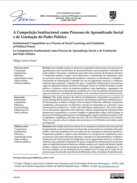Institutional Competition as a Process of Social Learning and Limitation of Political Power
DOI:
https://doi.org/10.30800/mises.2019.v7.1127Keywords:
Institutional competition, Efficiency, Social learning, Political power, Public policiesAbstract
This study analyses the effects of institutional competition as a process of social learning that promotes socioeconomic development and limits political power. For this purpose, it makes a critique of the concepts of allocative efficiency and perfect competition, and proposes an alternative concept of competition as a dynamic social process based on discovery, rivalry and information transmission. This work makes use of theoretical arguments and empirical evidence supporting the hypothesis that institutional competition is a process capable of significantly induce social change in the sense of limiting political power and aligning the supply of political products, such as legislation, regulations and state services with the actual demands of civil society. Thus, it is a process able to enhance the protection of civil liberties and induce social development.
Downloads



















